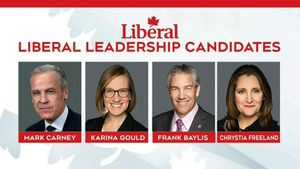On the third anniversary of the Russian invasion of Ukraine, the European Union reiterated its unwavering support for the nation, announcing significant financial aid and imposing new sanctions against Russia. European Commission President Ursula von der Leyen, who visited Kyiv to mark this pivotal date, emphasized the strategic importance of Ukraine for Europe.
During her visit, von der Leyen highlighted the EU's commitment to accelerate financial support for Ukraine, with plans to disburse €3.5 billion as early as March. This funding aims to assist Ukraine directly for rebuilding destroyed energy systems and strengthening its defense capabilities. "Europe is here to support Ukraine at this decisive moment," von der Leyen stated, reinforcing the EU's commitment to bolster Ukraine amid its struggle to fend off Russian military aggression.
Accompanying von der Leyen were several other top EU leaders, including António Costa, President of the European Council. Costa announced intentions to increase Ukraine's military support and improve EU defense readiness. Their visit coincided with new sanctions imposed on Russia, targeting its shadow fleet and establishing restrictions on trade, media, and individuals directly linked to the Kremlin's operations. This marks the EU's 16th sanctions package since the start of the war, intended to apply pressure on Russia as potential peace talks loom.
Spain’s Prime Minister Pedro Sánchez also joined the coalition, announcing a new military aid package worth €1 billion, aiming to bolster Ukraine's defense efforts significantly. With these developments, the EU is showcasing its determination to support Ukraine not only with verbal declarations but with tangible financial and military resources.
Von der Leyen's visit included stark warnings about the repercussions of Putin's objectives. She asserted, "Putin is trying more than ever to win this war on the ground. His goal remains Ukraine's capitulation." This statement underlines the urgency for international support, as the stakes extend beyond Ukraine’s future to the potential security of Europe itself. The implication being made by EU leaders is clear: should Ukraine fail, other neighboring nations could be at risk.
The backdrop of these announcements presents both opportunities and challenges. While the EU shows flexibility and readiness to assist Ukraine on its path toward European integration, the involvement of key figures from various nations amplifies differing intents and strategies among allied countries. This complexity is best illustrated by the differing approaches at the United Nations, where recent proposals from the US reflect attempts to garner international consensus without overtly condemning Russia as the aggressor.
Von der Leyen pointed out the importance of reforms within Ukraine and the necessity for continued efforts to meet EU criteria for membership. "The prospect of EU membership is real, but it depends significantly on Ukraine's ability to meet our expectations," she remarked, underscoring the interconnectedness of military support and political reforms. Ukraine's progress on these reforms remains vested heavily with the EU's continued backing.
Overall, as Ukraine continues to defend against Russian advances, European nations remain united, signaling their preparedness to support reforms and accelerate military commitment timeframes. The initiatives taken on this notable anniversary not only affirm Europe's stance against aggression but also represent comprehensive efforts to secure strategic partnerships and integration within the continent.
With multiple layers to navigate — from military support to reform measures and international diplomacy — the EU's approach is both multifaceted and proactive. The announcement of additional financial assistance and the establishment of sanctions against Russia showcases the bloc's determination to present a united front. All eyes will be on how these developments evolve, not just for Ukraine, but for the broader fabric of European security.



